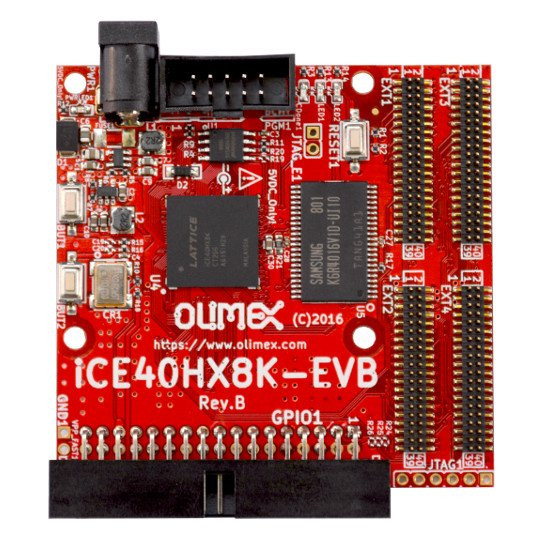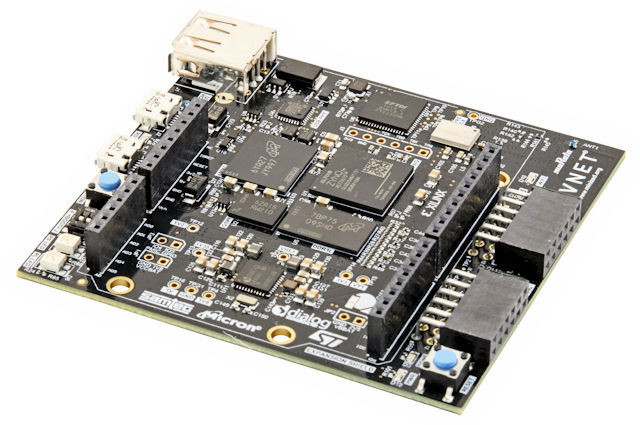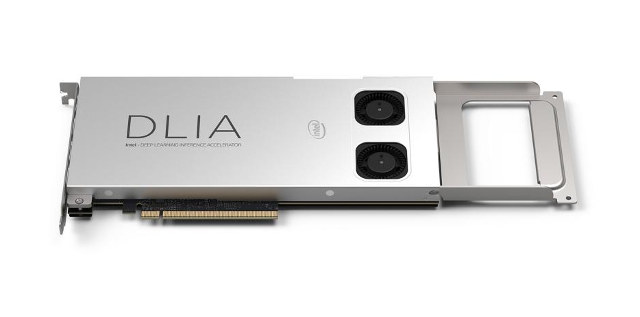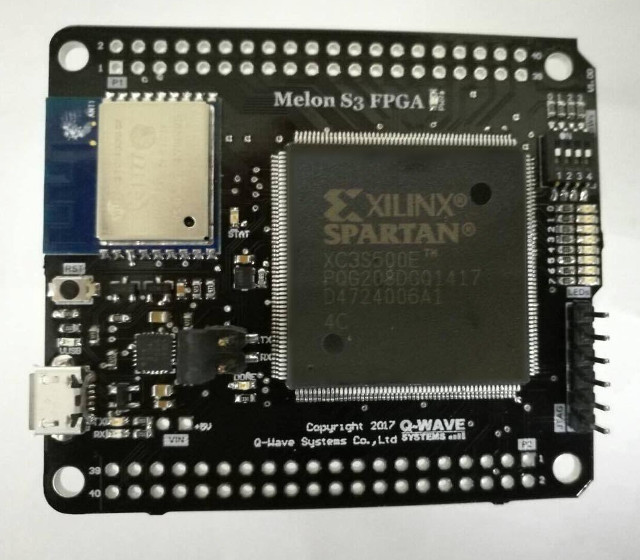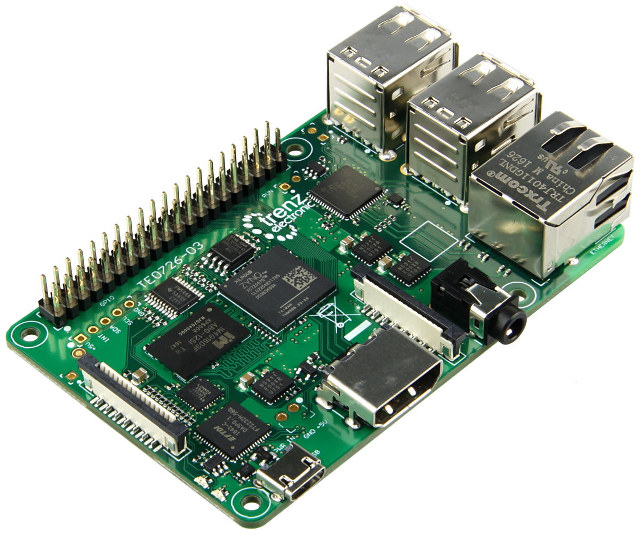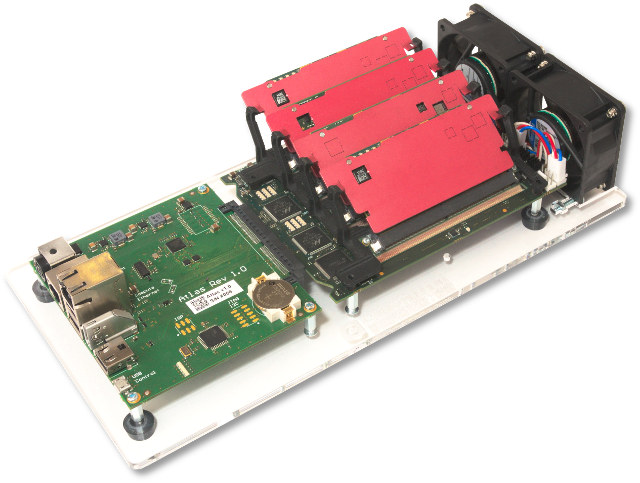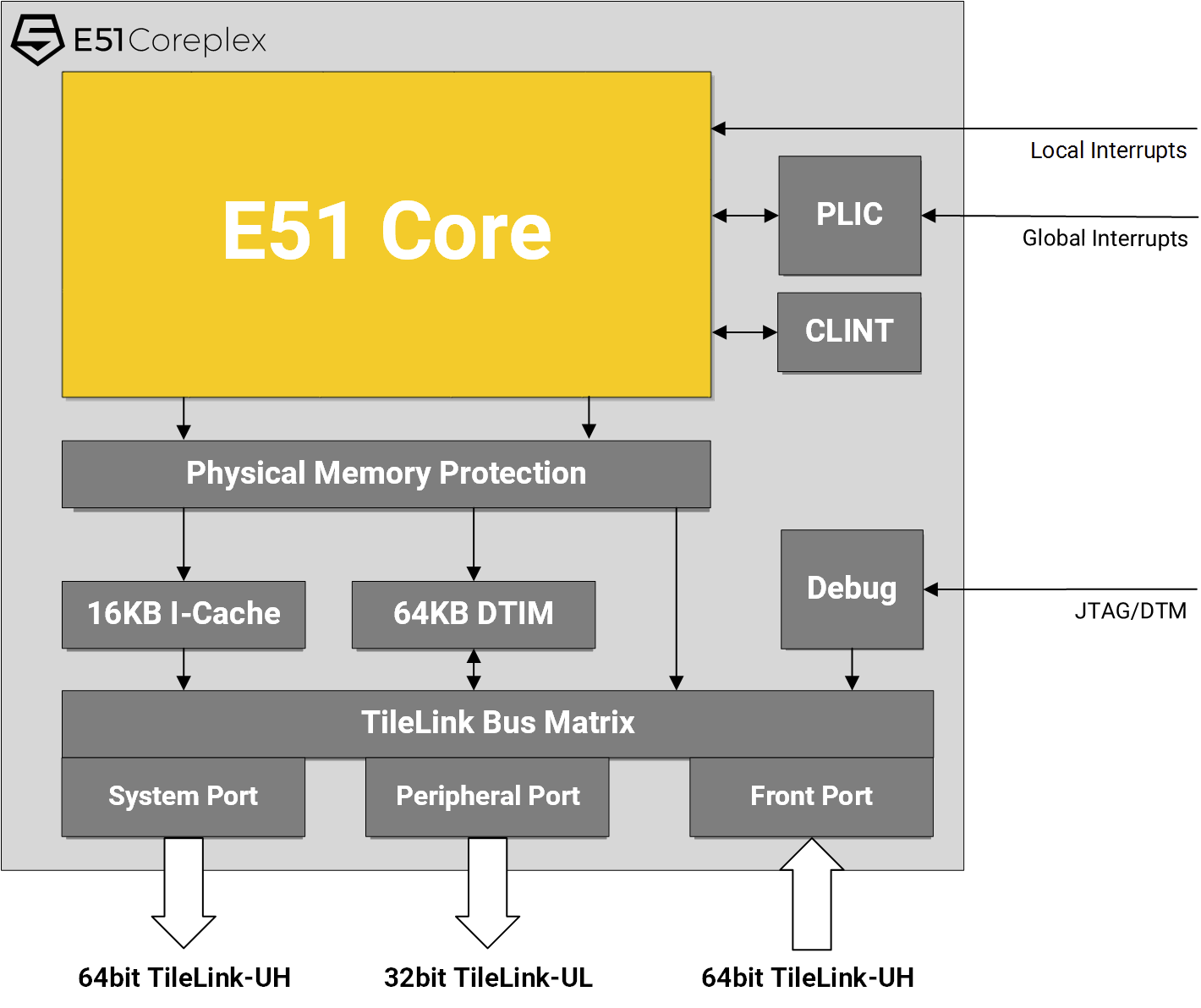Yesterday, we reported about Olimex’s open source hardware iCE40HX8K-EVB board with a Lattice iCE40 (HX8K) FPGA, and today, another iCE40 FPGA board, also open source hardware, appeared in my news feed with Trenz Electronic’s IceZero board specifically designed to be programmed using a Raspberry Pi Zero board. IceZero board specifications: FPGA – Lattice ICE40HX4K with 3520 logic gates, and 80 Kbit memory Storage – SPI Flash for FPGA self-configuration Misc – 3x User LEDs; User Clock: 100 MHz Expansion – 4x unpopulated PMOD Connectors; 40-pin Raspberry Pi female header Dimensions – 56 x 30.5mm (Raspberry Pi HAT Compatible) The board is supported by icoTC open source FPGA toolchain for Windows and Linux, which you can use in Raspberry Pi Zero (W), and other RPi board with a 40-pin header running Raspbian, as explained in that simple example in Github. Trenz electronic only shared part of the documentation, but you’ll find […]
Olimex Introduces 40 Euros iCE40HX8K-EVB Board with Lattice ICE40 FPGA
Last year, Olimex launched their first FPGA board with iCE40HX1K-EVB. The board is very cheap at 22 Euros, but what you can do with it is limited since it only comes with 1280 logic cells. The company has now introduced an upgraded model called iCE40HX8K-EVB with 7680 logic cells, and more I/O headers. Olimex iCE40HX8K-EVB specifications: FPGA – Lattice Semi iCE40HX8K-CT256 FPGA with 7680 logic gates, 960 Logic Array Blocks, and 128 Kbit memory System Memory – 256Kx16 SRAM (512KB SRAM) Storage – 2MB serial flash Expansion 34-pin connector to access FPGA I/Os 4x 40 pin connectors for GPIOs Debugging / Programming – 10-pin “PGM” connector Misc – 2x user buttons, reset button, 2x user LEDs, power & programming status LEDs Power Supply – 5V via power jack Dimensions – 67×65 cm The board is open source hardware with the KiCAD schematics and PCB layout, BoM, and Gerber files available […]
$89 MiniZed Development Board based on Xilinx Zynq Z-7007S SoC Includes WiFi, Bluetooth, Arduino Headers
Avnet has unveiled MiniZed development board – part of ZedBoard family – powered by a Xilinx Zynq Z-7007s SoC with an ARM Cortex A9 processor and FPGA fabric, supporting WiFi and Bluetooth connectivity, and equipped with Arduino and PMOD headers. MiniZed board (AES-MINIZED-7Z007-G) specifications: SoC – Xilinx Zynq-7007S single ARM Cortex A9 processor up to 677 MHz + FPGA with 23K logic cells, 1.8 Mb block RAM, 60 DSP slices System Memory – 512 MB DDR3L Storage – 8 GB eMMC flash, 128 Mbit QSPI flash Connectivity – Wi-Fi 802.11b/g/n and Bluetooth 4.1 plus EDR and BLE via Murata “Type 1DX” wireless module USB – 1x USB 2.0 host port Sensors – 3-axis accelerator and temperature sensor (LIS2DS12); Digital Microphone (MP34DT05) Expansion Interfaces: 2x Pmod compatible connectors with 16x GPIOs Arduino UNO R3 compatible header with 22x GPIOs Debugging – JTAG and serial console via micro USB port Misc – 2x […]
Intel DLIA is a PCIe Card Powered by Aria 10 FPGA for Deep Learning Applications
Intel has just launched their DLIA (Deep Learning Inference Accelerator) PCIe card powered by Intel Aria 10 FPGA, aiming at accelerating CNN (convolutional neural network) workloads such as image recognition and more, and lowering power consumption. Some of Intel DLIA hardware specifications: FPGA – Intel (previously Altera) Aria 10 FPGA @ 275 MHz delivering up to 1.5 TFLOPS System Memory – 2 banks 4G 64-bit DDR4 PCIe – Gen3 x16 host interface; x8 electrical; x16 power & mechanical Form Factor – Full-length, full-height, single wide PCIe card Operating Temperature – 0 to 85 °C TDP – 50-75Watts hence the two cooling fans The card is supported in CentOS 7.2, and relies on Intel Caffe framework, Math Kernel library for Deep Neural Networks (MKL-DNN), and works with various network topologies (AlexNet, GoogleNet, CaffeNet, LeNet, VGG-16, SqueezeNet…). The FPGA is pre-programmed with Intel Deep Learning Accelerator IP (DLA IP). Intel DLIA can […]
Melon S3 FPGA Arduino & Raspberry Pi Compatible Board is Programmable over WiFi using ESP8266 WiSoC
Q-Wave Systems, an embedded systems company based in Thailand, has designed Melon S3 FPGA board powered by a Xilinx Spartan 3E FPGA with WiFi connectivity added through a ESP8266 module programmable with the Arduino IDE , and featuring two Raspberry Pi compatible headers. The FPGA bitstream can be updated over WiFi, and does not require a JTAG debugger. Melon S3 FPGA specifications: FPGA – Xilinx Spartan XC3S500E FPGA with 500K gates, 73Kb Distributed RAM, 4 Digital Clock Manager (DCM), 20 Multipliers (18×18), 360 Kb Block RAM WiFi module – WROOM-2 with Espressif ESP8266 32-bit MCU @ 80 MHz supporting 802.11 b/g/n WiFi. Storage – 4MB SPI flash in total with 1MB for ESP8266, 3 MB for FPGA Expansion – 2x 40-pin Raspberry Pi compatible headers; 3.3V tolerant Debugging – Onboard USB-UART Silicon Labs CP2104 for configuration, debugging and power; 6-pin JTAG port for debugging/programming Misc – 8x Users LEDs, 4x […]
Meet Zynqberry, a Xilinx Zynq FPGA Board with Raspberry Pi 2/3 Form Factor
Earlier this year, I wrote about Trenz Electronic’s Xilinx Zynq Ultrascale+ system-on-module, but I’ve just found out I missed another interesting product from the company. The ZynqBerry is a board powered by Zilinx Zync Z-7007S or Z-7010 ARM + FPGA SoC with Raspberry Pi 2/3 form factor. ZynqBerry specifications: SoC Xilinx Zynq XC7Z007S-1CLG225C (Z-7007S) single core ARM Cortex-A9 MPCore up to 766MHz + FPGA with 23K logic cells Xilinx Zynq XC7Z010-1CLG225C (Z-7010) dual core ARM Cortex-A9 MPCore up to 866 MHz + FPGA with 28K logic cells System Memory – 128 or 512 MB DDR3L Storage – 16 MB Flash SPI flash + micro SD card slot Video Output – HDMI, MIPI DSI interface Audio Output – HDMI, 3.5mm audio jack (PWM audio only) Connectivity – 100 MBit Ethernet via (LAN9514 USB Hub with Ethernet USB – 4x USB 2.0 host ports Camera – MIPI CSI-2 interface Expansion – 40-pin Raspberry […]
Christmann RECS|Box Atlas Quad Apalis Microserver Evaluation Kit Supports Four Toradex Apalis SoM
System-on-modules are normally used in low volume embedded systems, but they can also be used in microservers, for example to upgrade capacity as needed. Christmann informationstechnik + medien GmbH has developed a microserver evaluation kit taking up to 4 Toradex Apalis SoMs for example based on Nvidia Tegra K1 processor, and also offers full rack systems with up to 72 modules. Christmann RECS|Box Atlas Quad Apalis specifications: Modules – 4x Slots for Apalis SoM Connectivity – 1 GBit/s Compute Ethernet, 1 GBit/s Management Ethernet Video Output – 1x HDMI USB – 3x USB host ports, 1x micro USB port Misc – 5 Status LEDs for USB, communication, and serial console, 4x fan connectors, KWM switch, 5x temperature sensors, 6x current sensors, 1x voltage monitor, fan speed monitoring Power Supply – 12V via a 4-pin jack Dimensions – 300 x 145 x 68 mm The evaluation kit includes an Atlas board […]
SiFive Launches 32-bit E31 Coreplex & 64-bit E51 Coreplex RISC-V Processors, Reveals Pricing
SiFive unveiled their Freedom U500 and E500 open source RISC-V SoCs last year, and a little layer launched HiFive1 Arduino compatible development board based on SiFive Freedom E310 processor. The company has now launched their non-open source Coreplex IP also based on RISC-V ISA with the 32-bit E31 Coreplex and 64-bit E51 Coreplex, and explained details about pricing. Some of the key features of the processors are listed below: E31 Coreplex 32-bit RV32IMAC core @ 900 to 1.5 GHz (with 28nm process) Advanced Memory Subsystem – 16KB, 2-way Instruction Cache, Instruction Tightly Integrated Memory (ITIM) option, up to 64KB Data Tightly Integrated Memory (DTIM) support Up to 16 local interrupts with vectored addresses Performance – 1.61 DMIPS/MHz ; 2.73 Coremark/MHz Power Consumption 28nm HPC process – Core only: 150 DMIPS/mW ; Coreplex: 41 DMIPS/mW 55nm LP process – Core only: 95 DMIPS/mW; Coreplex: 16 DMIPS/mW Applications: Edge Computing, Smart IoT […]



